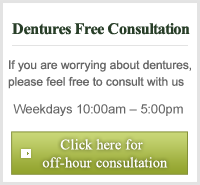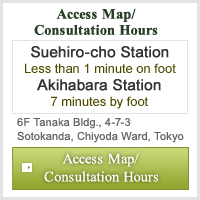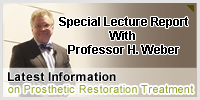2010年6月13日 - 2010年6月19日 « トップへ » 2010年7月25日 - 2010年7月31日
2010年7月16日
My teeth are loose due to gingivitis. What treatment options are there?
Q. I was diagnosed with gingivitis. It looks like I am loosing bone throughout my jaw. I was told that I should have my loose teeth removed soon, but I want to know what treatment options are available after that. (woman in her 40s)
A. In cases in which gingivitis has spread throughout the mouth, removing even just one tooth will cause extra stress on all of the remaining teeth. You must be careful as this can lead to rapid tooth loss.
A new concept called 'Minimum Intervention' was recommended in an academic journal at the World Dental Federation (FDI) in 2000.
Minimum Intervention (MI) is the idea that treatment should aim to reduce the filing down of natural teeth as much as possible.
Of course everyone aims to live their entire life with their own teeth intact. That is the greatest joy. And in recent years, preventative medicine has become widely practiced at dental clinics with amazing results. But on the other hand, it is still true that many middle-aged and elderly people suffer from tooth decay and gum disease. If dentists get too caught up in the idea of limiting the amount of tooth filing, they may leave patients suffering in silence without doing anything. In these cases, the patients' conditions will only get worse.
When middle-aged or elderly patients suffer from gingivitis or cavities and it can be assumed that their bite alignment will break down, it is up to dentists to optimistically provide effective treatment and secure the remaining teeth.
Dentists who offer pessimistic treatment intervention run the risk of exposing their patients to concentrated stress on their few remaining teeth which will ultimately lead to further tooth loss and a worsening situation.
In order to avoid such consequences, I believe that along with providing secure fixation throughout the jaw, we must provide functioning long-term oral treatment aimed at stabilizing bite alignment.
In your case, it is necessary to first seek treatment for the gingivitis, decide which teeth can be preserved, and then have your remaining teeth secured in place. (Teeth are very weak against lateral wiggling and loose teeth are bound to get worse.)
Our clinic's treatment options for securing teeth firmly in place include bridges and the telescope system. Please consult with us to learn which method is best for you before you make any decisions.
Juvenile periodontitis and dentures
Q. I am still in my 30s and I have been diagnosed with juvenile periodontitis. I have had symptoms of periodontitis since I was in my teens. At the time, I visited the dental clinic and received instructions on how to use a toothbrush. I can wiggle my teeth by simply pressing my tongue against them. Recently I have been experiencing inflammation and pain, and a few of my teeth already seem as though they are about to fall out. I have a bridge on my molars but the whole thing is loose. If I lose my bridge will I have to get dentures?
A. Juvenile periodontitis (aggressive periodontitis) is a form of periodontitis that occurs in young people in their teens and 20s. It is said that the early appearance of this disease may be genetic or may be due to an abnormality in the immune system. One characteristic of this disease is that a bacteria called Actinobacillus actinomycetemcomiotans is usually present in large numbers.
In your case, it will be necessary to deal with your loose bridge and receive treatment for gingivitis at the same time. It is necessary to consider how you will handle the situation when your loose teeth with deep pockets surrounding them fall out. Frankly speaking, you will need to get false teeth or have dentures made. After that you should receive treatment for your gingivitis. Gingivitis is a disease in which the bone around a tooth becomes loose and eventually the tooth falls out. It is said to usually start when people are in their 20s. By having a dentist examine the inside of your mouth for the existence of bacteria that causes gingivitis, you will be able to get a better diagnosis and receive treatment.
There are 6 types of bacteria that cause gingivitis.
1. Porphylomonas gingivalis
2. Tannerella forsythensis
3. Treponemadenticola
4. Prevotera intermedia
5. Actinobacillus actinomycetemcomiotans
6. Fusobacterium nucleatum
[3DS, a new technique to get rid of gingivitis-causing bacteria in the mouth]
After removing plaque using PMTC (professional mechanical tooth cleansing), a procedure performed by a dental hygienist using specialized technology and equipment, a mouthpiece tray fitted to the patient's tooth alignment is placed in the mouth and medicine is applied to the surface of the teeth and left to sit for a certain period of time. This process is not negatively affected by saliva and antibacterial and fluoride medicine can be safely administered to the teeth.
3DS Method
1. Examine the saliva to determine whether or not bacteria elimination is necessary.
2. Provide ample explanation of the bacteria elimination process to the patient.
3. Take a mold of the patient's teeth for the construction of a mouthpiece tray.
4. Carry out PMTC to remove plaque from the surface of the patient's teeth.
5. Add medicine to the mouthpiece tray and let it sit for 5 minutes to eliminate bacteria.
6. Repeat the bacteria elimination process one week later.
7. Add fluoride gel to the mouthpiece tray at home and hold it in your mouth for 5 minutes twice a day at home (once in the morning and once after brushing your teeth at night before going to bed) in order to strengthen the teeth.
At our clinic we provide an examination report to the patient upon conducting a BML (Inc.) saliva test. The 3DS effect only lasts 4 - 6 weeks so we recommend that you have bacteria eliminated periodically.
When your gingivitis symptoms stabilize you must then secure your teeth to prevent them from wiggling. There is a simple procedures in which you attach loose teeth to the surrounding teeth with a dental adhesive, but if you have already lost many teeth, we recommend the telescope system as a treatment method (dentures developed in Germany).









